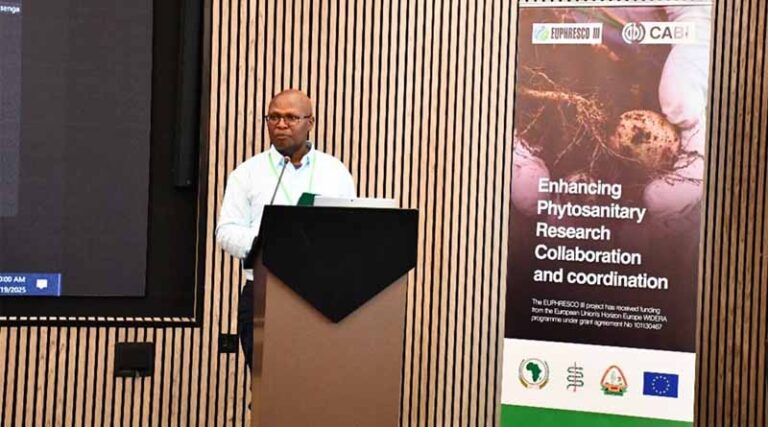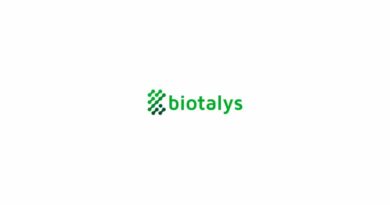
Workshop Explores Plant Health Concerns As Part Of European Phytosanitary Research Coordination Network
09 September 2025, Africa: CABI, in collaboration with Kenya Plant Health Inspectorate Service (KEPHIS), AU InterAfrican Phytosanitary Council (AU-IAPSC), and EUPHRESCO Network Office, has taken part in a consultation workshop exploring a range of phytosanitary research concerns.
The workshop in Nairobi, Kenya, was held as part of the Euphresco network for phytosanitary research coordination and funding collaboration to help enhance national and regional phytosanitary research coordination for greater global food security and safe trade.
This consultation workshop sought to map the status of phytosanitary research in Africa, validate phytosanitary research priorities, identify challenges and opportunities for funding phytosanitary research, and co-create a roadmap for phytosanitary research collaboration in Africa.
Research coordination for greater plant health around the world
By building on the foundations developed by the Euphresco network, the EUPHRESCO III project aims to enhance national and regional phytosanitary research coordination for greater plant health at national, regional and global level.
The Euphresco network brings together organizations with different mandates (e.g. national plant protection organizations, research funders, policy makers, regulators and research organizations) interested in collaborating on common Phytosanitary research priorities.
It aims to strengthen the coordination of national and regional phytosanitary research programs, primarily focusing on statutory plant health (emerging and regulated pests).
Globally, phytosanitary research coordination has been identified as a key strategic activity within the IPPC Strategic Plan 2030 (Agenda 7) and within the AU-IAPSC Plant Health Strategy for Africa (2022-2036).
Collaboration and coordinated solutions across borders
Dr Daniel Karanja, Deputy Director, Research and Innovation at CABI, said, “The health of plants is increasingly jeopardized by climate change and the cross-border movement of pests, which intensifies these threats. Consequently, addressing these issues demands collaboration and coordinated solutions across borders.
“This workshop was a pivotal step in identifying phytosanitary research needs and fostering collaboration, aligning with the vision of Phytosanitary Research Coordination as highlighted in the IPPC Strategic Plan 2030 and EUPHRESCO’s objectives.
“We are proud to have had many of the institutions involved in that initiative represented including universities, National Agricultural Research institutions, National Plant Protection Organizations, funding agencies and development partners.
“This demonstrates that strong collaboration can help find solutions to shared needs.”
He added that the future of phytosanitary research, for improvement of regulations, policy, market access and safe trade depends on collaborating and coordinating phytosanitary research at national, regional and international level .
KEPHIS is willing to implement and provide a clear road map
Dr Isaac Macharia, Director Phytosanitary and Biosecurity at KEPHIS, said phytosanitary research is not commonly addressed yet it is an important sector that provides solutions to phytosanitary needs that affects trade.
“Several international markets are lost because of impact of existing and new pest invasions in the commodities, dynamic market requirements e.g new EU phytosanitary regulations 2024/2004 ,” he said.
He gave the example of False Codling Moth (FCM) in roses and capsicum which he says research and other related needs have not been addressed in a long time. These pests, he added, affect trade and are not usually prioritized.
Dr Macharia said, “Data sharing is key in phytosanitary research. KEPHIS is willing to implement and provide a clear road map for phytosanitary Research that can be emulated by other NPPOs in Africa.”
He said that the workshop served as a good opportunity to highlight solutions as well as the need to have a centre of phytosanitary excellence that puts a great emphasis on phytosanitary research.
Dr Andrew Edewa, Director, Standards and SPS Measures, TradeMark Africa, encouraged the participants to identify opportunities for innovative and trade facilitative solutions to phytosanitary needs.
Dr Baldissera Giovani, Coordinator of the Euphresco network, said there is need for testing new ways of working and validating funding for phytosanitary projects .
He said, “Funding has been difficult to link with research coordination. There is need for some structural bodies with clear roles to help foster research collaboration.”
Also Read: DialogueNEXT India: 60 Years of Borlaug’s Legacy, Global Leaders Convene to Confront Hunger
📢 If You’re in Agriculture, Make Sure the Right People Hear Your Story.
From product launches to strategic announcements, Global Agriculture offers unmatched visibility across international agri-business markets. Connect with us at pr@global-agriculture.com to explore editorial and advertising opportunities that reach the right audience, worldwide.






